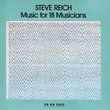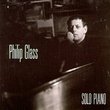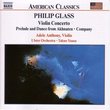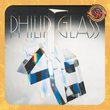"...it could be very fresh and clean."
kg5 | Central Texas | 04/18/2007
(4 out of 5 stars)
"Einstein On The Beach was first performed in 1976 and the first recording was released in 1979. This version of Einstein was release in 1993. To date, these existing reviews span a period of 8 years - which to me, is a testament to the significance of this masterwork.
And in the same spirit as another reviewer, I too must confess that I prefer the original recording over this revised, modified and re-recorded version. I will say that this version is not at all "bad" - it is excellent. But to me the heart of the music lies with the original recording. I can understand the desire to release a "newer" version of this recording, but unfortunately in it's more polished form, it has lost a great deal of charm and, as has been mentioned, humor. Oddly the readings in this new recording sound very affected and almost pretentious. The music here - played with a digital perfection, has a sense of more mechanicality and a less human feel than the previous release (CBS Masterworks). Between the two versions, I think there are about 20 additional minutes on this re-recording than the earlier one, but for my taste this does not really add anything of startling consequence to the piece overall.
It is said that all music is mathemetics. And since we all know about Einstein's love for the violin, it was an incredible intelligent idea to merge the two into a singular revolutionary operatic concept. As the reader is aware: it is now generally recognized that EOTB one of the most significant contributions to late 20th century music and performance, and simultaneously re-defined the potential of opera.
So why buy this edition over the other? Honestly, I can't give you one solid reason. Both have positives and negatives. Get both. But listen to the earlier one first!
"
Hard to fault
Mr. E. J. Ross | Northern England | 04/12/2007
(5 out of 5 stars)
"Before this, I'd only really heard Glass's solo piano music. Where I found his repetitive figures unmoving in that context, here - fleshed out with vocals and synths - they become something else, something hypnotic, beguiling and quite beautiful. Even over 3 hours, it is hard to tire of the gradually shifting rhythms, which move at break-neck speed.
It is hard to grasp the effect the music has by listening to the samples above, and you shouldn't think, 'well, this is fine - but for 3 hours?!' - as it is much more than the sum of its parts. That effect is akin to a visual illusion on an epic scale. Only musical, if you will.
This edition is hard to fault: it's very well recorded, despite the set being 14 years old and it's all very attractively packaged. The booklet is thorough, although I would have liked to see some colour photos from the performance, not just the badly reproduced black & white ones we are provided with. That aside, well worth the money.
"
Glittering Polish on an Old Gem
Gaston D. Musell | NY, NY | 01/02/2009
(4 out of 5 stars)
"I was lucky enough to get a seat at the Metropolitan Opera House to see the first production of Einstein On the Beach. The production was dazzling, the music compelling, the sound was "otherworldly, lunar." I bought the 4 Record set on Tomato Records, loved it, taped it, and bought an additional copy to have when my original copy was worn out.
I was suprised and intrigued by the concept of a new recording, and finally purchased it and played it.
The sound is vastly improved and is a testament to technology itself, but there are certain things that will have to grow on me. The Spaceship seems too short and too fast, Knee Play 3 is played too quickly, the vocals of Lucinda Childs and Sheryl Sutton are mixed too low, almost inaudible.
Why do these irritate me? Because after listening to the same version of Einstein for 30 years, a new version (even by the same artist), is like a change in history. I'm so used to the tones, the sequences, the highs, the lows of the original, I'm not sure I will ever get used to the new version.
What I love in the new one, which I only played once so far, are the richness of the Train 1, the overall clarity of the production, the length of the 3 cd set.
And the final puzzle: why does Philip Glass not play on this version?
I'm glad I bought it. I will play it till I love it throughout and learn to live with an alternate history."
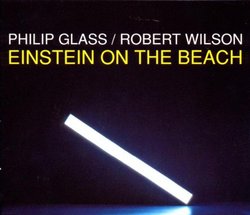

 Track Listings (6) - Disc #1
Track Listings (6) - Disc #1